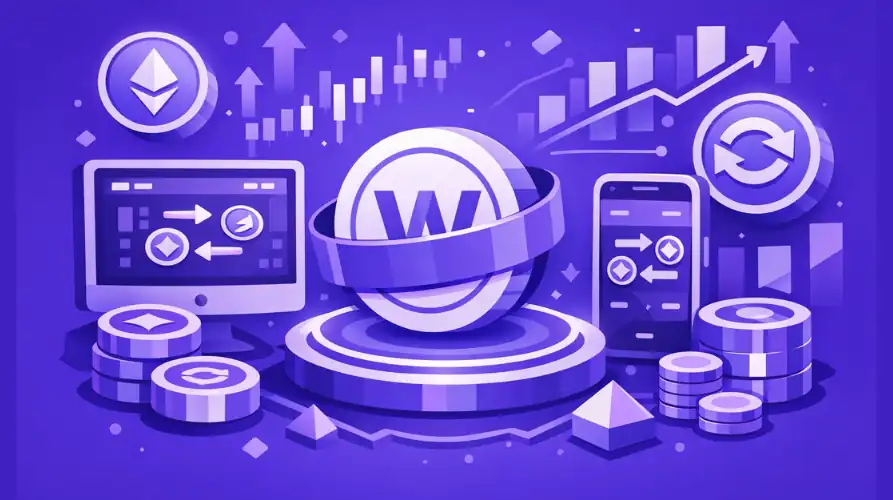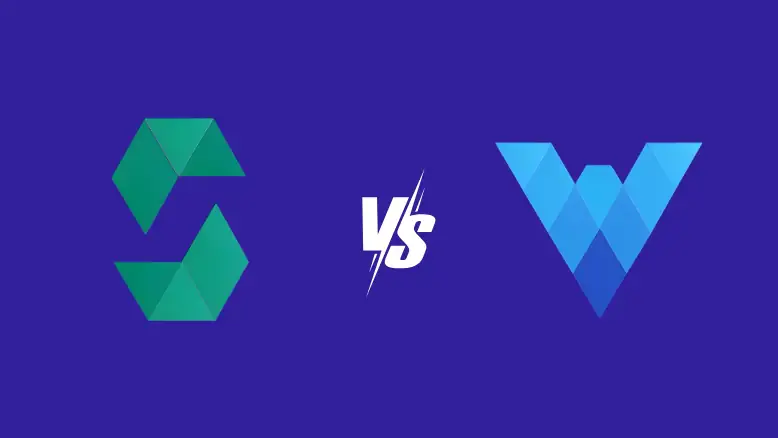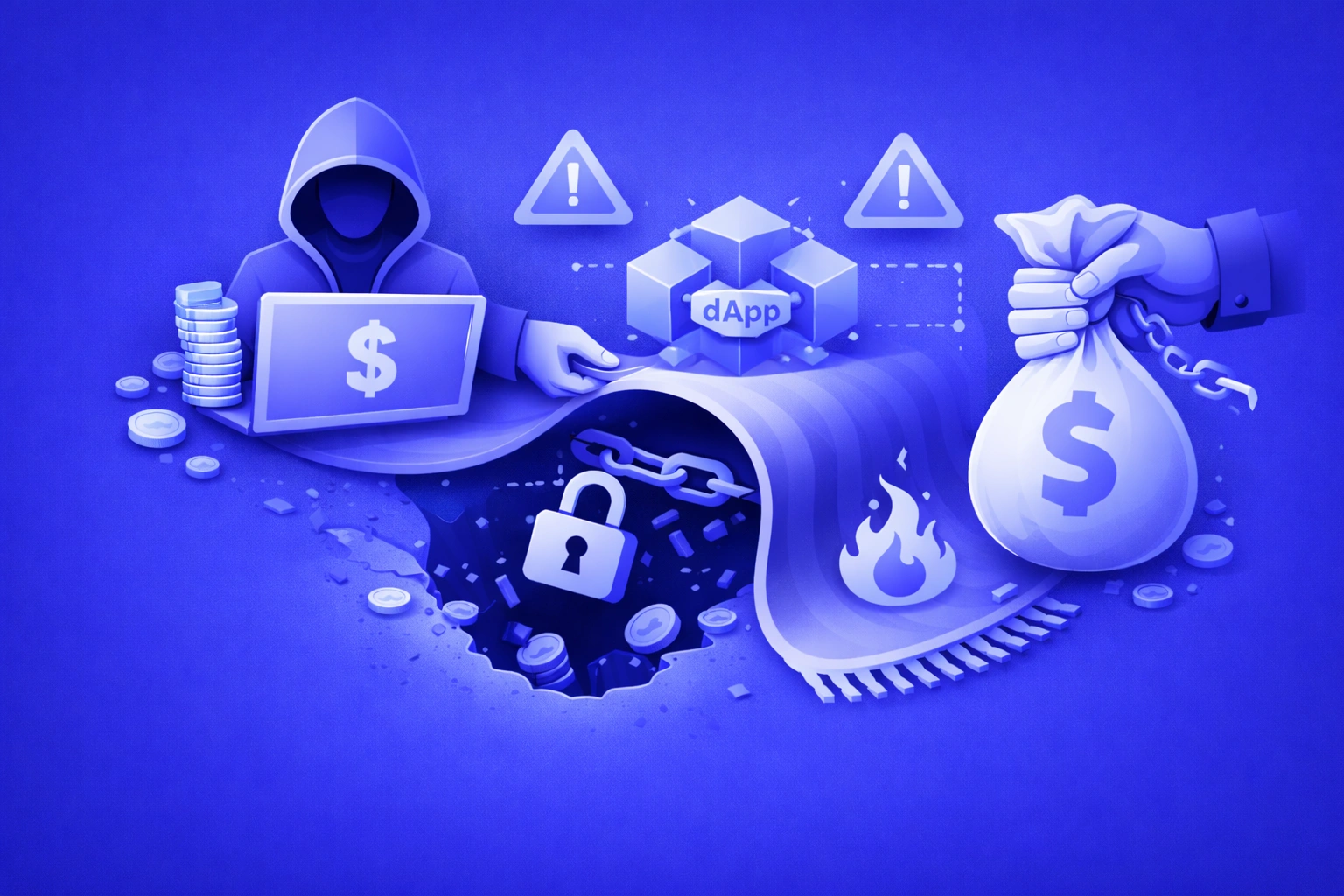Wrapped tokens have become essential infrastructure in decentralized finance, enabling assets from one blockchain to function seamlessly on another. These digital assets bridge different blockchain ecosystems, allowing Bitcoin holders to participate in Ethereum DeFi protocols and enabling cross-chain liquidity across decentralized exchanges. With wrapped assets now holding billions in value and major institutions like Coinbase selecting Chainlink’s CCIP as the exclusive bridge for $7 billion in wrapped tokens, understanding how these assets work has become crucial for anyone involved in DeFi trading.[1] This comprehensive guide explores what wrapped tokens are, how they function in DEX platforms, and why they matter for the future of decentralized trading.
Key Takeaways
- Cross-Chain Bridge: Wrapped tokens represent assets from one blockchain on another, enabling cross-ecosystem participation.
- 1:1 Backing: Each wrapped token is backed by an equivalent amount of the original asset held in secure custody.
- DeFi Access: Wrapped tokens allow Bitcoin and other non-EVM assets to participate in Ethereum-based DeFi protocols.
- Enhanced Liquidity: By enabling cross-chain trading, wrapped tokens significantly increase liquidity on decentralized exchanges.
- Smart Contract Based: The wrapping process uses smart contracts to manage minting, burning, and verification.
- Multi-Chain Expansion: Wrapped tokens now operate across Ethereum, Solana, BNB Chain, Avalanche, and other networks.
- Institutional Adoption: Major financial institutions increasingly utilize wrapped assets for cross-chain operations.
What is a Wrapped Token in DEX?
A wrapped token in a decentralized exchange is a digital asset that represents another cryptocurrency designed to operate on a different blockchain. For example, Wrapped Bitcoin (WBTC) represents Bitcoin on the Ethereum blockchain, allowing BTC holders to use their assets within the Ethereum DeFi ecosystem. The original Bitcoin remains securely locked while an equivalent wrapped version circulates on the target network.
This cross-chain capability solves a fundamental limitation in blockchain technology. Different blockchains operate independently and cannot natively communicate or transfer assets between each other. Wrapped token development bridges this gap, enabling seamless asset movement across ecosystems. When users want to participate in Ethereum DeFi using Bitcoin, wrapped tokens provide the mechanism to do so without selling their original holdings.
The process maintains a 1:1 backing ratio, meaning each wrapped token is fully backed by an equivalent amount of the original asset held by custodians. This verifiable reserve system ensures users can always redeem their wrapped tokens for the underlying cryptocurrency, maintaining price parity and user confidence across blockchain development platforms.
How Wrapped Tokens Work
The wrapped token mechanism involves several coordinated steps managed through smart contracts and custodial systems. Understanding this process is essential for anyone involved in crypto token solution implementation or cross-chain trading.
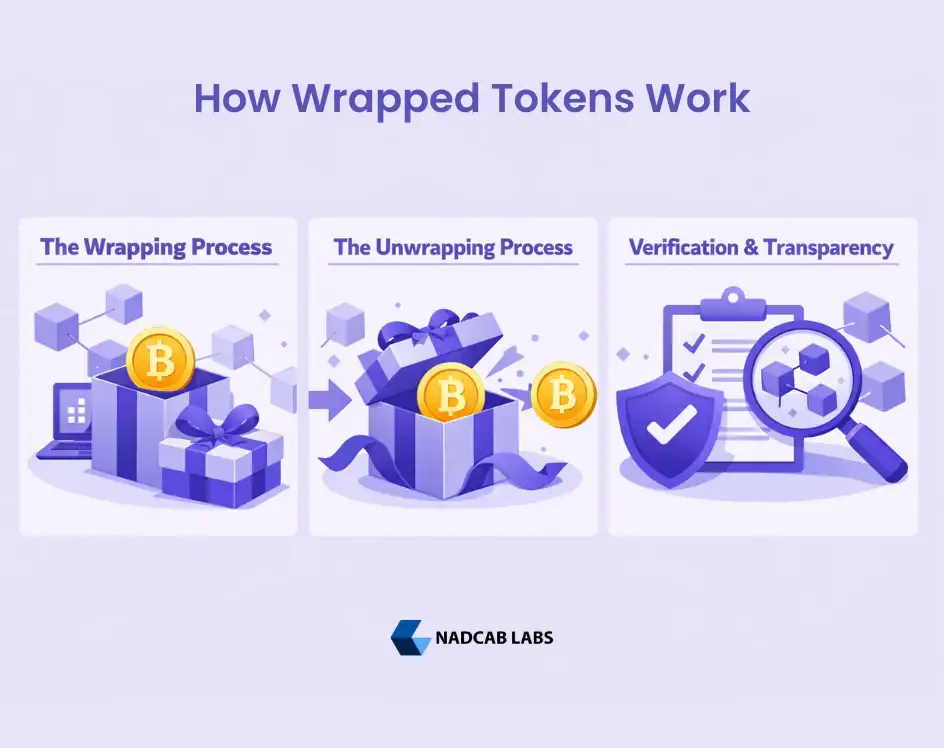
The Wrapping Process
When a user wants to wrap their Bitcoin, they send BTC to a designated custodian address. The custodian securely stores this Bitcoin and triggers the minting of an equivalent amount of WBTC on Ethereum. This wrapped token adheres to the ERC-20 standard, making it compatible with all Ethereum-based applications and smart contracts. The token development process ensures seamless integration with existing DeFi infrastructure.
The Unwrapping Process
Redeeming wrapped tokens reverses this process. Users send their WBTC to a burn address, which destroys the wrapped tokens. Once the burn is verified on the Ethereum blockchain, the custodian releases the equivalent Bitcoin to the user’s specified address. This minting and burning mechanism maintains the 1:1 peg between wrapped and original assets.
Verification and Transparency
Modern wrapped token systems employ proof-of-reserve mechanisms that allow anyone to verify the backing. Chainlink and other oracle networks provide on-chain verification that reserves match circulating supply. This transparency builds trust and enables crypto token development teams to create reliable cross-chain solutions.[2]
Popular Wrapped Tokens in DeFi
Several prominent governance tokens have established benchmarks in the blockchain industry, demonstrating effective decentralized governance in practice. Understanding these examples helps illustrate how governance token development translates into real-world applications.
| Wrapped Token | Original Asset | Target Network | Primary Use Cases |
|---|---|---|---|
| WBTC | Bitcoin (BTC) | Ethereum, Multi-chain | DeFi lending, liquidity pools, collateral |
| WETH | Ether (ETH) | Ethereum | ERC-20 compatibility, DEX trading |
| cbBTC | Bitcoin (BTC) | Base, Solana, Multi-chain | Institutional DeFi, cross-chain transfers |
| Wrapped USDC | USD Coin | BNB Chain, Others | Stablecoin liquidity, cross-chain payments |
| wDOT | Polkadot (DOT) | Ethereum | Ethereum DeFi participation |
Benefits of Wrapped Tokens on DEXs
Wrapped tokens provide substantial advantages for decentralized exchange users and the broader DeFi ecosystem. Understanding these benefits helps traders and developers make informed decisions about cross-chain strategies.
Enhanced Liquidity
By enabling assets from different blockchains to trade on a single DEX, wrapped tokens dramatically increase available liquidity. Bitcoin holders can contribute to Ethereum liquidity pools, Litecoin users can access Solana DeFi, and cross-chain capital flows freely between ecosystems. This liquidity aggregation benefits all traders through reduced slippage and better price execution. Recent DeFi market statistics show staking of non-EVM tokens in DeFi wrappers reached $3.4 billion, demonstrating significant cross-chain adoption.[3]
Expanded DeFi Access
Bitcoin’s blockchain, while highly secure, lacks native smart contract functionality for complex DeFi applications. Wrapped Bitcoin enables BTC holders to access lending protocols like Aave and Compound, participate in yield farming, provide liquidity on Uniswap, and use their Bitcoin as collateral. This functionality expansion significantly increases the utility of otherwise limited assets without requiring users to sell their holdings.
Portfolio Diversification
Wrapped tokens allow traders to maintain exposure to their preferred assets while accessing opportunities across different blockchain ecosystems. A Bitcoin maximalist can keep BTC exposure while earning yield in Ethereum DeFi. This flexibility supports diverse investment strategies and risk management approaches that would be impossible without cross-chain development solutions.
Wrapped Token Integration in DEX Platforms
Successful DEX software development requires careful integration of wrapped token functionality. The technical implementation involves multiple components working together seamlessly.
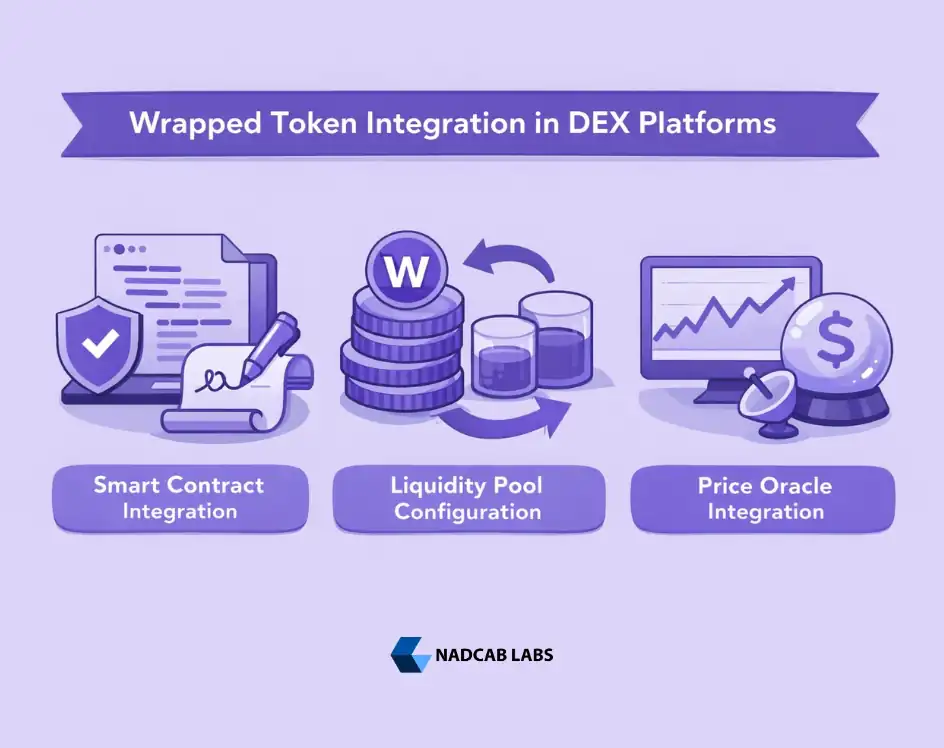
Smart Contract Integration
DEX platforms must integrate with wrapped token smart contracts to enable trading, swapping, and liquidity provision. This integration involves connecting to token contracts, implementing proper approval mechanisms, and ensuring accurate balance tracking. Token development teams work closely with DEX developers to ensure compatibility and optimal user experience.
Liquidity Pool Configuration
Creating efficient liquidity pools for wrapped tokens requires careful consideration of pairing strategies, fee structures, and incentive mechanisms. Many DEXs offer enhanced rewards for wrapped token liquidity providers to bootstrap initial liquidity and maintain competitive trading conditions. This approach has proven effective in building deep markets for cross-chain assets.
Price Oracle Integration
Accurate price feeds are essential for wrapped token trading. DEX platforms integrate oracle networks like Chainlink to ensure wrapped tokens reflect the true value of their underlying assets. This integration also supports proof-of-reserve verification, allowing users to confirm that wrapped tokens maintain proper backing at all times.
Security Considerations for Wrapped Tokens
While wrapped tokens provide significant benefits, users and developers must understand the associated security considerations. Cross-chain bridges have historically been targets for attackers, making security paramount in wrapped token implementation.
Custodial Risks
Many wrapped tokens rely on centralized custodians to hold the underlying assets. This creates counterparty risk if the custodian faces operational issues, regulatory challenges, or security breaches. Understanding custodian reputation, insurance coverage, and audit history is essential before using wrapped tokens. Projects should implement thorough token audit procedures to verify security measures.
Smart Contract Vulnerabilities
The smart contracts managing wrapped token minting and burning represent potential attack vectors. Vulnerabilities in these contracts could allow attackers to mint unbacked tokens or steal locked assets. Regular security audits, bug bounty programs, and formal verification help mitigate these risks in blockchain development projects.
Bridge Security
Cross-chain bridges connecting different networks have suffered significant exploits. Choosing wrapped tokens that use well-audited, battle-tested bridging solutions reduces exposure to these risks. The industry trend toward decentralized bridge designs using multiple validators provides additional security compared to single-custodian models.
Building Cross-Chain DeFi Solutions?
Professional teams provide comprehensive wrapped token development and DEX integration services for seamless cross-chain functionality.
Future of Wrapped Tokens in DeFi
The wrapped token landscape continues evolving with new technologies and institutional adoption driving innovation. Several trends will shape the future of cross-chain assets in decentralized exchanges.
Multi-Chain Expansion
Wrapped tokens are expanding beyond Ethereum to operate across Solana, Avalanche, BNB Chain, Aptos, and emerging networks. This multi-chain development approach provides users with more options for utilizing their assets while maintaining flexibility in choosing preferred ecosystems based on fees, speed, and available applications.
Institutional Adoption
Major financial institutions increasingly recognize wrapped tokens as infrastructure for institutional DeFi participation. Coinbase’s wrapped asset suite, backed by Chainlink’s cross-chain protocol, demonstrates institutional-grade solutions entering the market. This institutional interest drives further development of compliant, secure wrapped token infrastructure.
Trustless Bridge Solutions
New bridging technologies aim to reduce or eliminate custodial requirements through cryptographic proofs and decentralized validator networks. Solutions like atomic swaps and BitVM-based bridges promise cross-chain transfers without centralized intermediaries. These innovations address the primary security concerns associated with traditional wrapped token development models.
Understanding Different Token Types
Wrapped tokens represent one category among many types of crypto token operating in the blockchain ecosystem. Understanding how wrapped tokens differ from utility tokens, governance tokens, and security tokens helps users make informed decisions about their DeFi participation strategies.
For comprehensive information about the relationship between different digital assets, our coin and token solution guide provides detailed explanations of token standards, blockchain architectures, and implementation considerations for various crypto token development projects.
Conclusion
Wrapped tokens have become foundational infrastructure for cross-chain DeFi, enabling assets to flow freely between blockchain ecosystems. By allowing Bitcoin holders to access Ethereum DeFi, stablecoin users to operate across multiple chains, and diverse assets to contribute to unified liquidity pools, wrapped tokens solve fundamental interoperability challenges in decentralized finance.
Understanding how wrapped tokens function, their benefits and risks, and their role in DEX platforms helps traders and developers make informed decisions about cross-chain strategies. As institutional adoption grows and bridging technology improves, wrapped tokens will continue playing a critical role in connecting disparate blockchain ecosystems.
For projects seeking to implement wrapped token functionality or integrate cross-chain assets into their platforms, working with experienced Token Development teams ensures proper security, compliance, and user experience. Professional Crypto Development Company expertise helps navigate the technical complexities of cross-chain development while building robust, scalable solutions that serve users across the expanding multi-chain landscape.
Frequently Asked Questions
A wrapped token is a cryptocurrency that represents another asset on a different blockchain. It maintains a 1:1 peg with the original asset, allowing cross-chain functionality while preserving value.
Users send Bitcoin to a custodian who locks it securely and mints an equivalent amount of WBTC on Ethereum. This WBTC can be used in DeFi applications and redeemed for Bitcoin at any time.
Wrapped tokens from reputable providers with transparent reserves, regular audits, and proven track records are generally considered safe. However, users should understand custodial and smart contract risks.
ETH is Ethereum’s native currency while WETH is an ERC-20 token version of ETH. WETH is required for certain DeFi applications that only accept ERC-20 tokens for standardized interactions.
While rare, wrapped tokens can temporarily deviate from their underlying asset price due to liquidity issues, custodian concerns, or market volatility. Proper reserve verification helps maintain confidence.
Fees vary by provider but typically include network transaction fees plus small service fees for minting and burning. Some platforms offer fee-free wrapping to encourage adoption.
Reviewed & Edited By

Aman Vaths
Founder of Nadcab Labs
Aman Vaths is the Founder & CTO of Nadcab Labs, a global digital engineering company delivering enterprise-grade solutions across AI, Web3, Blockchain, Big Data, Cloud, Cybersecurity, and Modern Application Development. With deep technical leadership and product innovation experience, Aman has positioned Nadcab Labs as one of the most advanced engineering companies driving the next era of intelligent, secure, and scalable software systems. Under his leadership, Nadcab Labs has built 2,000+ global projects across sectors including fintech, banking, healthcare, real estate, logistics, gaming, manufacturing, and next-generation DePIN networks. Aman’s strength lies in architecting high-performance systems, end-to-end platform engineering, and designing enterprise solutions that operate at global scale.
